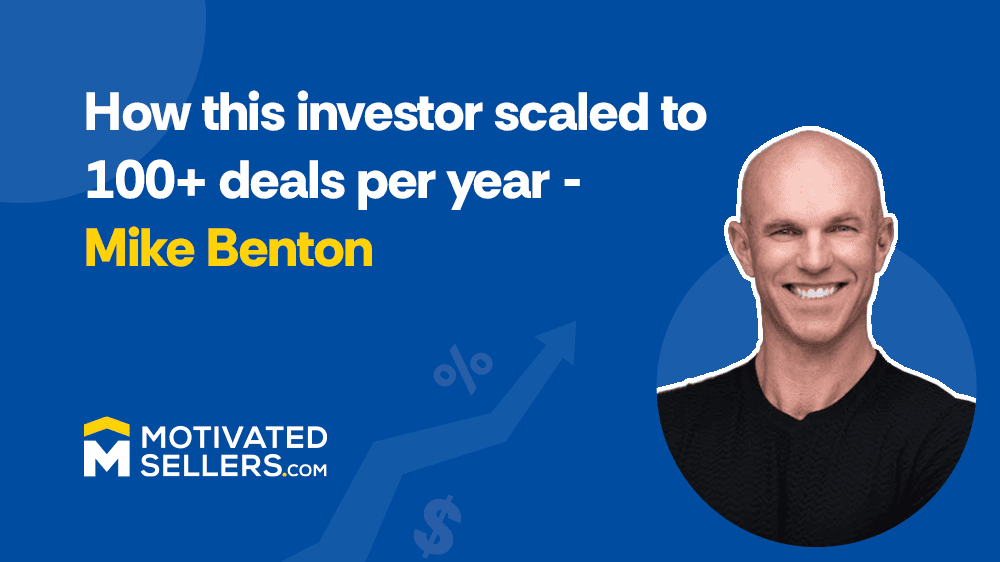

Mike Benton has been in the real estate and mortgage industry for over 20 years, and he's done about everything you can think of. As the division president at Responsive Mortgage, his team makes the mortgage approval process simple, quick, and stress-free for buyers.
He sold his real estate development company in 2017, and now he is into mortgages and new construction.
These days, he's built 25 single-family homes in Port St. Joe, Florida. Some to sell, some to keep as rentals. He grew up in his family's printing business in South Boston, Virginia, and earned a full tennis scholarship to Coastal Carolina University, and today he lives in Siesta Key with his wife and daughter.
Rich Dad, Poor Dad by Robert Kiyosaki inspired me to start my investment journey back in 2002. I was the number one sales guy at a software company in Florida, but I wanted to invest and achieve true freedom of time. I started my journey as a realtor in Myrtle Beach, South Carolina, in 2004.
Leads that Are Worth Flipping, Holding, or Repositioning
Back in 2005, I was working with a developer to sell pre-construction condos. The developer was converting hotels in Myrtle Beach to condos. I had played tennis at Coastal Carolina, so I knew that area, which is right outside of Myrtle Beach.
I was interested in acquiring an apartment complex and found a deal at 4.5 million back in 2005. The expected exit price was $12.5 million. After renovations, I sold the property in a total time of less than 16 months.
We have bought and renovated foreclosed properties at scale in Broward and Palm Beach County. My biggest year was 2015 with over 100 flips. Overall, I have done more than 250 rehabs.
Our goal was to achieve cash-on-cash return. While scaling, we had three asset managers and over a hundred people on our construction team, such as 1099 contractors. We built a software to acquire, renovate, and resell assets. That's what allowed us to exit the company in the late 2000s. In early 2018, I sold my company.
Today, I run a company called Responsive Mortgage, and I have partnered with John Cheplak, who's one of the biggest names in the real estate coaching world. My other partner, Preston Guyton, has been in the online lead generation space since the early 2000s. His website, "Easy Home Search," is among the top six real estate portals in the country behind realtor.com, Zillow, homes.com, Movado, and Rocket Homes.
A couple of years ago, we started thinking about how we can bring more revenue to existing big real estate teams. And the number one source for revenue generation is mortgages. We partner with team leads and teach them how to run a mortgage business. To understand the reason, you need to see what's been happening in the industry over the last 12-24 months.
Without fully integrated auxiliary services (that increase revenue or reduce costs), you'll miss out on growth. In the past 13 months, we have partnered with 18 different teams. We have another four to eight teams coming on board. Our company has gone from zero to 10 million in revenue in less than 12 months.

The most critical mistake is overleverage, and the second biggest issue is the "construction" aspect of investing. There are three pillars in the fix-and-flip world: purchase, construction/repair, and financing.
Most investors buy at the right price but struggle hard at really estimating the true cost of construction with existing properties. Today, I invest more in new construction because it gives predictable, long-term revenue compared to a flip.
There are several ways to finance deals for real estate investors. You could go for a 40-year interest-only loan. You can obtain 100% financing for rehab projects.
The missing piece of the puzzle is that you need to build the right team. If you have the right people, you can put together creative financing in any market.
There is no way to build a $20 million portfolio without investing in relationships and mastermind groups. I met my business partner Jason through a mastermind group called "Boardroom."
Most investors look at the price tag to enter high-end investing communities but don't forget that the initial investment to entry comes with a huge ROI.
Your network is your net worth. In the right mastermind group, you'll find people who are generously sharing their knowledge so you don't repeat the same mistakes as them.
You always have two options: learn by the wisdom of others or learn from experience, and experience is really expensive.
One of our investors wanted to build a portfolio of 100 properties in Ohio within 24 months. His company has now been acquiring one property per week for the last two years.
He owns a $10 million portfolio in Siesta Key and is trying to exit the short-term rental market in Siesta Key. The goal is to position new assets in Ohio for long-term appreciation as a part of a large portfolio.
We provide funding for properties, i.e., single-family homes and multifamily up to 12 units. After acquisition, either the BRRR method is utilized or a cash-out refinance after a light rehab.
Let's say he acquires a property for $80k, which is worth around $125k. He will buy that property with cash. We will get all of his cash back within 30-45 days, giving him the leverage to continue acquiring more properties.

Most people choose markets because of trends, which is wrong. I really recommend reading the book, "Acres of Diamonds". It's an old classic book that contains immensely valuable investing principles.
So here is a story about a gentleman who was searching for gold and diamonds. He looked everywhere but in his backyard. And, you guessed it right, the gold was hidden right in his backyard.
There are enough deals in every market. A new investor must start with properties that are located within a 1-hour drive. Unless you have dug up all the diamonds in your own backyard, you don't start looking into other areas.
My best deals happened through real estate agent relationships. My investment business in Broward and Palm Beach counties succeeded because of established relationships with realtors. That's exactly how I ran my mortgage business.
I have been in the real estate industry for 20-plus years, and I know how real estate agents think. Most would want to become investors. The easiest way is to teach them how to become investors. Help them grow their portfolio without asking for anything in return.
Real estate agents see opportunities long before investors can see them. I work one-on-one with agents, and here is my general offer besides building a solid relationship:
"Give us a call first if you find a house that needs to be rehabbed or might be a good rental opportunity. We will be there within X number of hours, same day. We will give you an offer on the spot, and we will not renegotiate."
We never negotiated, and that's why we receive consistent callbacks from agents. The closing happens within three to five days once title is back. No contingencies or inspections. That's how I will re-build the business today.
When to push and when to take a pause.
Risk is a personal decision and depends on your long-term and short-term goals.
"I feel confident in my ability to execute," Mike mentioned, and therefore he is willing to take bigger risks than folks without experience or those who don't want to lose.
It's possible to mitigate the risk by calculating what worked in the past and understanding the pulse of your local market.
The biggest failure and lesson came in 2006-2007 when I put under contract a 152-unit apartment complex in Birmingham, Alabama. The deal made sense, but it was a decision based on fear vs. faith, and I was dealing with the wrong people.
The integrity and plan of your business partners matter more than anything else. To make a long story short, I was already under contract when I found out that the other person was unscrupulous.
I had invested $100k in earnest money and over $100k in attorney fees. The contract was guaranteed by Section 8, and the negotiations on this particular building were extremely complicated.
It's also about listening to your gut and your spouse. I had the choice to lose $200,000 in 2007 or invest another $500,000. My wife wanted to let go of the deal and move on. And I was making a decision based on fear. The deal was closed as I wired the money, but the entire transaction ended up being a nightmare. A year and a half down the road, I ended up doing a deed in lieu of foreclosure. The market was crashing, and the seller and buyer had planned the entire transaction. They had other properties in foreclosure or distressed status, and the market was crashing. There was no way to fight in court as I didn't have the capital or the mental bandwidth.
The lesson is to spend more time perfecting partnerships with contractors, agents, attorneys, and lending team rather than just thinking about the deal.
What One Habit or Mindset Change Made You Successful?
Getting alcohol out of my life changed everything for me. I have seen more growth in the last 18-24 months than in my entire career. I have become a better husband, father, and leader.
The second reason for my success is my mentor and partner, John Shelac. It all boils down to a few basic concepts:
The goal is to improve every life we touch.
If we can help someone personally, their professional life will also improve. We have had loan officers who have gotten sober. Our operational and support folks have lost 20-40 pounds. My company is big on setting the right culture. We meet daily with our entire team all across the country.
As of today, there are 80 people on our team. We meet quarterly to do some different exercises. We meet three times a year face-to-face. I will continue to build this culture in my company at a deeper level.
You can connect with Mike Benton via Instagram and Facebook or his website, responsivemortgage.com. Responsive Mortgage has a nationwide footprint with various services offered.